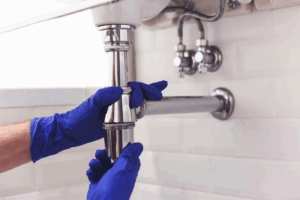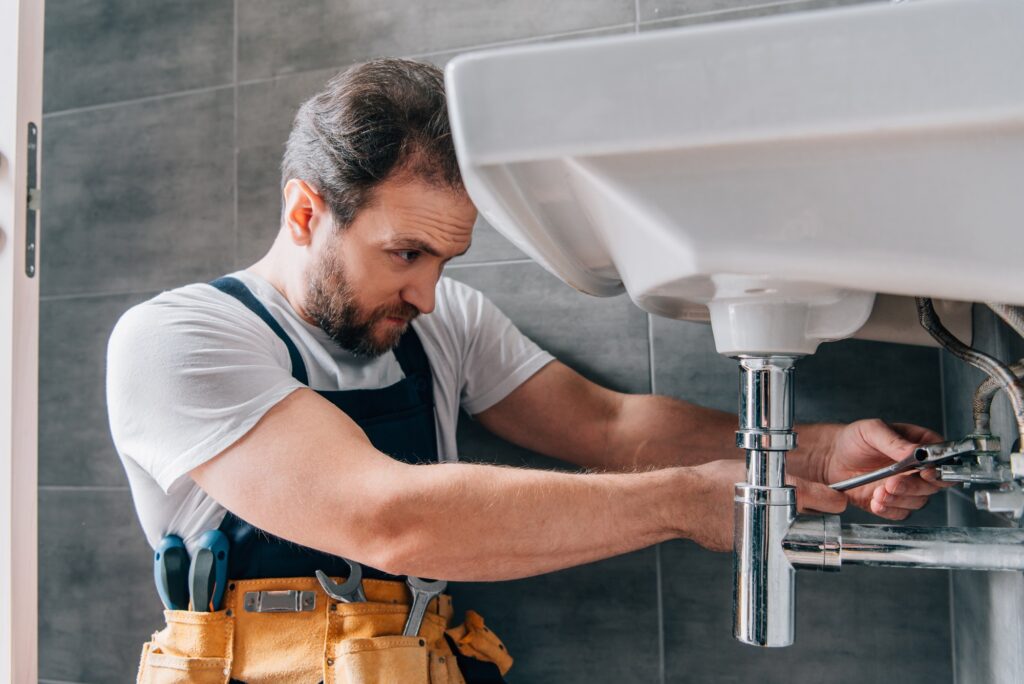What Does a Plumber Do?
Plumbing is a vital service that is often taken for granted until something goes wrong. From a leaky faucet to a blocked toilet or a broken water heater, plumbing problems can quickly disrupt your daily routine. But have you ever wondered exactly what plumbers do on the job? In this blog post, we’ll explore the role of a plumber, what their job entails, and why plumbing is such an essential part of maintaining a functional home or business.
What is Plumbing?
 Plumbing refers to the system of pipes, fixtures, and other apparatus required for the water supply and drainage in buildings. It involves both water systems and sewage systems that are essential for providing clean water, draining waste, and ensuring the overall comfort and health of a household or commercial building. While most people think of plumbing as merely fixing leaks or clogged drains, there’s much more to the job than that.
Plumbing refers to the system of pipes, fixtures, and other apparatus required for the water supply and drainage in buildings. It involves both water systems and sewage systems that are essential for providing clean water, draining waste, and ensuring the overall comfort and health of a household or commercial building. While most people think of plumbing as merely fixing leaks or clogged drains, there’s much more to the job than that.
The Role of a Plumber
A plumber is a trained professional who specializes in installing and repairing the systems that allow water and waste to flow throughout a building. Their work is essential to creating a safe and comfortable living or working environment. Let’s take a closer look at what plumbers actually do on a day-to-day basis.
Installing Plumbing Systems
One of the primary tasks of a plumber is installing new plumbing systems. This includes setting up water supply lines, drainage systems, and gas lines. Whether it’s a new home or a commercial building, plumbers ensure that the plumbing is correctly set up to meet the needs of the space. They work closely with architects, builders, and other contractors to ensure that the plumbing systems are integrated seamlessly into the structure.
Repairing Leaks and Pipe Damage
Plumbers are also known for their expertise in identifying and repairing leaks. Over time, pipes can develop leaks due to wear and tear, temperature changes, or external pressure. A skilled plumber will use various tools and techniques to locate the source of the leak, which may not always be visible to the naked eye. Once identified, the plumber will either patch the leak or replace the affected pipe altogether. Repairing leaks promptly is crucial to prevent water damage, mold growth, and higher utility bills.
Unclogging Drains and Toilets
Clogged drains and toilets are among the most common plumbing problems people face. While some clogs can be handled with a plunger, others may require professional help. Plumbers use specialized tools such as drain snakes, hydro-jetting machines, and video inspection devices to locate and clear blockages in the plumbing system. These tools allow plumbers to safely remove debris, grease, and other materials causing the blockage, ensuring that water can flow freely through the pipes once again.
Maintaining and Repairing Water Heaters
Water heaters are essential for providing hot water to a building, but they require regular maintenance to keep them functioning properly. Plumbers are trained to inspect and repair water heaters. This includes flushing out sediment buildup, checking the thermostat, replacing heating elements, and ensuring that the unit is operating efficiently. Proper maintenance can extend the life of a water heater and prevent costly breakdowns.
Gas Line Installation and Repair
Plumbers also work with gas lines, which are used to deliver natural gas for heating, cooking, and other purposes. Installing or repairing gas lines is a highly specialized and dangerous job that requires a great deal of expertise. Plumbers must ensure that gas lines are installed properly to avoid leaks that could pose serious safety hazards. Regular inspections of gas lines are also essential to prevent potential accidents.
Bathroom and Kitchen Remodels
Many homeowners and business owners hire plumbers when renovating their kitchens or bathrooms. Plumbers play a key role in ensuring that new sinks, bathtubs, showers, toilets, and dishwashers are correctly installed and connected to the existing plumbing system. They may also be required to reroute pipes to accommodate new fixtures or layouts. Plumbing for remodels can be a complex task, as it often involves working within tight spaces and coordinating with other contractors.
Plumbing Inspections and Maintenance
Plumbers perform regular inspections of plumbing systems to identify potential problems before they become major issues. During a plumbing inspection, they will examine pipes, water pressure, drains, and other components of the system. By identifying small problems early, plumbers can help prevent costly repairs down the line. Routine maintenance, such as cleaning drains, checking for leaks, and inspecting water heaters, can also improve the efficiency and lifespan of a plumbing system.

Why Plumbing is Important
Without plumbing, we would face major challenges in daily life. Access to clean water for drinking, cooking, bathing, and sanitation is essential for health and well-being. Plumbing systems also help in managing waste, ensuring that wastewater is safely disposed of without contaminating living environments. The work that plumbers do, often behind the scenes, is crucial to maintaining the safety, comfort, and functionality of homes and businesses.
Additionally, plumbing helps in conserving water and energy. A well-maintained plumbing system can reduce water wastage, lower energy bills, and ensure that water is used efficiently. By properly insulating pipes, fixing leaks, and upgrading outdated fixtures, plumbers can help homeowners save money and contribute to sustainability efforts.
Plumbing is an essential part of modern life, and the role of a plumber is far more intricate than simply fixing a leaky faucet. From installing new plumbing systems to repairing water heaters and ensuring that waste is properly managed, plumbers are responsible for maintaining the systems that keep our homes and businesses functioning smoothly. If you ever encounter a plumbing issue, don’t hesitate to call a professional plumber—they have the expertise to solve the problem efficiently and effectively, ensuring that your plumbing system operates as it should for years to come.